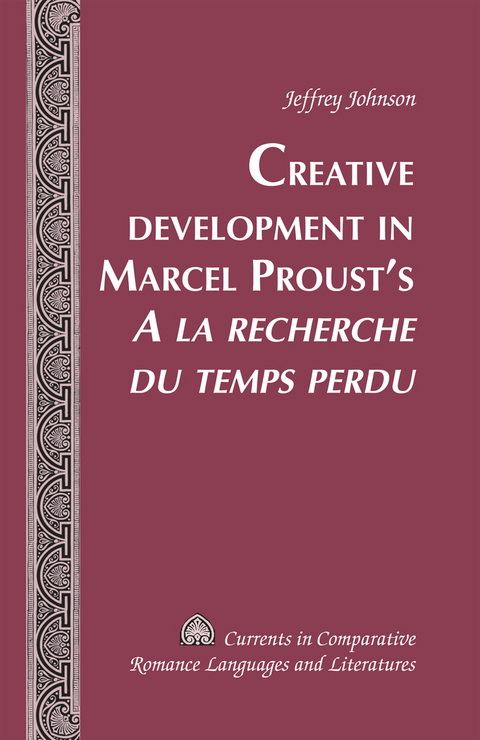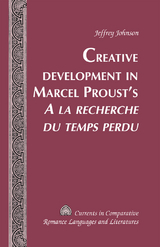Creative Development in Marcel Proust’s «A la recherche du temps perdu»
Seiten
2012
|
New edition
Peter Lang Publishing Inc (Verlag)
978-1-4331-1747-3 (ISBN)
Peter Lang Publishing Inc (Verlag)
978-1-4331-1747-3 (ISBN)
- Titel z.Zt. nicht lieferbar
- Versandkostenfrei innerhalb Deutschlands
- Auch auf Rechnung
- Verfügbarkeit in der Filiale vor Ort prüfen
- Artikel merken
Creative Development in Marcel Proust's A la recherche du temps perdu
This book focuses on creative development and empowerment in Marcel Proust’s A la recherche du temps perdu. It demonstrates Proust’s proof of the Romantic notion that art originates in the self of the artist. Approached as a Bildungsroman, the psychological aspects of this development in Marcel, the principal character, are considered in terms of the stimulus/response mechanism in living organisms. It verifies Proust’s argument that time in the body, including all that one experiences unconsciously, is present within us whether it is accessible to memory or not.
Through involuntary memories and inspiration at the end of the novel, Marcel finds the means to write the book he has long wished to write. Inspiration provides a link between Marcel, the novel’s protagonist, and Proust, its author. This volume balances its analysis of Marcel’s creative development and empowerment through inspiration with Proust’s experiences in May 1909, when he realized that the concept of the fourth dimension would serve as the unifying thread for his novel. Modernity is viewed as a crucial influence in the transformation of society that Proust’s novel chronicles. This study posits an allegorical reading of the novel in the relationship of the birth of the modern citizen to the making of an artist in an era of doubt.
This book focuses on creative development and empowerment in Marcel Proust’s A la recherche du temps perdu. It demonstrates Proust’s proof of the Romantic notion that art originates in the self of the artist. Approached as a Bildungsroman, the psychological aspects of this development in Marcel, the principal character, are considered in terms of the stimulus/response mechanism in living organisms. It verifies Proust’s argument that time in the body, including all that one experiences unconsciously, is present within us whether it is accessible to memory or not.
Through involuntary memories and inspiration at the end of the novel, Marcel finds the means to write the book he has long wished to write. Inspiration provides a link between Marcel, the novel’s protagonist, and Proust, its author. This volume balances its analysis of Marcel’s creative development and empowerment through inspiration with Proust’s experiences in May 1909, when he realized that the concept of the fourth dimension would serve as the unifying thread for his novel. Modernity is viewed as a crucial influence in the transformation of society that Proust’s novel chronicles. This study posits an allegorical reading of the novel in the relationship of the birth of the modern citizen to the making of an artist in an era of doubt.
Jeffrey Johnson is an independent Proust scholar living and working in New York City. Although he has spent much of his adult life in creative practice, Johnson has a background as a trained scientist. He brings insights from both fields to his reading, thinking, and writing about Proust’s novel, A la recherche du temps perdu. Over the last several years, Johnson has presented papers at numerous conferences and given lectures and seminars on Proust in China and the United States. An article on Proust and the birth of the modern citizen appeared in the fall 2011 issue of the journal Nouvelles Francographies.
| Reihe/Serie | Currents in Comparative Romance Languages and Literatures ; 204 | Currents in Comparative Romance Languages and Literatures ; 204 |
|---|---|
| Verlagsort | New York |
| Sprache | englisch |
| Maße | 155 x 230 mm |
| Gewicht | 460 g |
| Themenwelt | Geisteswissenschaften ► Philosophie |
| Geisteswissenschaften ► Psychologie ► Allgemeine Psychologie | |
| Geisteswissenschaften ► Psychologie ► Pädagogische Psychologie | |
| Geisteswissenschaften ► Psychologie ► Verhaltenstherapie | |
| Geisteswissenschaften ► Sprach- / Literaturwissenschaft ► Anglistik / Amerikanistik | |
| Geisteswissenschaften ► Sprach- / Literaturwissenschaft ► Literaturwissenschaft | |
| Geisteswissenschaften ► Sprach- / Literaturwissenschaft ► Romanistik | |
| ISBN-10 | 1-4331-1747-9 / 1433117479 |
| ISBN-13 | 978-1-4331-1747-3 / 9781433117473 |
| Zustand | Neuware |
| Haben Sie eine Frage zum Produkt? |
Mehr entdecken
aus dem Bereich
aus dem Bereich
Techniken der Verhaltenstherapie
Buch (2024)
Julius Beltz GmbH & Co. KG (Verlag)
35,00 €




